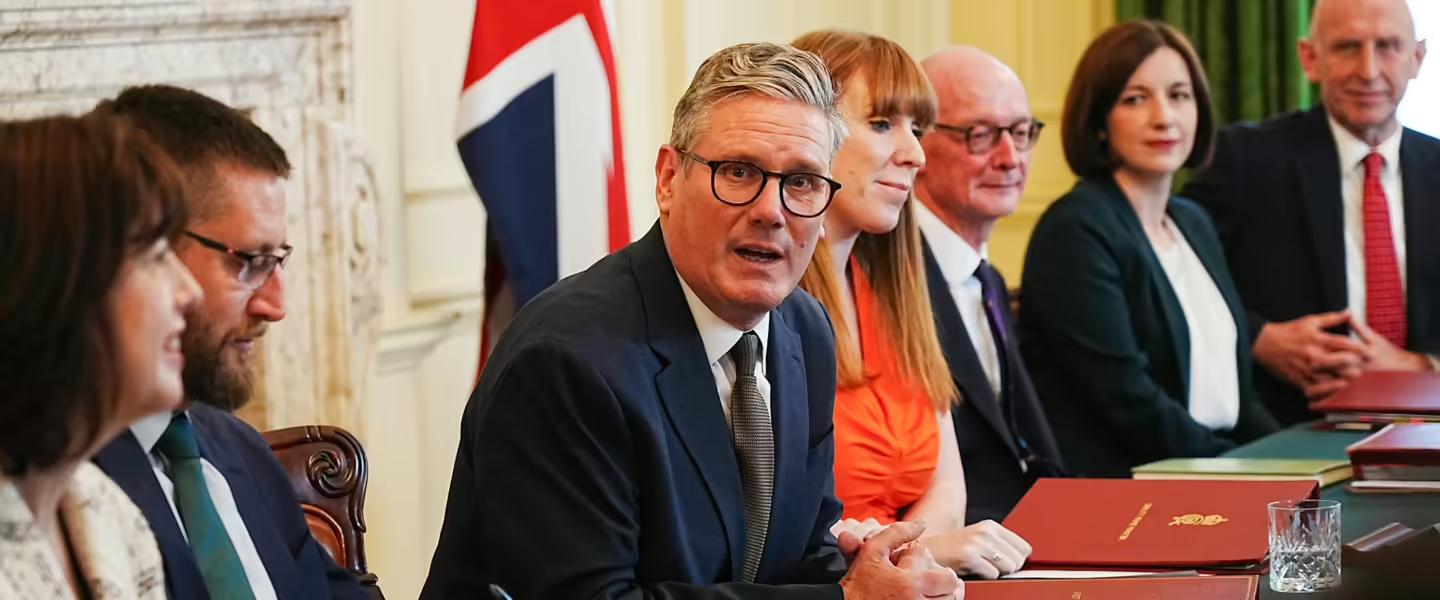Sir Keir Starmer’s State-School-Educated Cabinet
A quiet revolution in the UK’s top governing tier.
|
Listen To This Story
|
The old stereotype of the British prime minister being an “old boy” from a private boarding school — surrounded by like-minded cronies who all went to the same crusty institutions, wearing absurd tail-coated and waistcoat uniforms, suffering beatings, abusing “fags” (that is, younger boys treated as something close to indentured servants), and then blithely proceeding to Oxford or Cambridge to learn how to rule the world — is not far from the truth.
When he was a boy, Boris Johnson (Eton; Balliol College, Oxford) told friends he wanted to be “world king,” probably saying the silent part out loud. No doubt many of his privileged friends were brought up to think the same.
Of the 57 prime ministers beginning with Robert Walpole in 1721, 47 attended private schools, with 33 going to just three alma maters: Eton (20), Harrow (7), or Westminster (6). Forty-five PMs went on to either Oxford or Cambridge.
The class divisions in Britain were never better delineated — and perpetuated — than in the school system, which put the vast majority of youth into state schools with much smaller budgets than the small number of exclusive private schools with their greater endowments and resources. This split-screen approach to education meant that a small number of privileged children were given much greater opportunities than the majority of their fellow citizens, an entrenched system that is only beginning to change.
“Change” was the slogan of the recent winning Labour campaign, and one of the quieter changes the new prime minister, Sir Keir Starmer, has already instituted is in the make-up of his cabinet.
Only one of his 25 cabinet ministers went to private school, and that one — new Transport Secretary Louise Haigh — is “quite uncomfortable” about her education, admitting in a 2015 interview that Labour MPs “very much looked down” on private education, “and rightly so.”
Starmer, proud that 90 percent of his appointments matriculated from comprehensive schools, said that “it reflects the aspiration at the heart of our country.”
Starmer himself went to a public grammar school before it became an independent, fee-paying institution. He received a sixth-form bursary to fund his studies before going on to Leeds University and Oxford.
Rachel Reeves, the first female chancellor of the exchequer — roughly equivalent to the US secretary of the treasury, and the second-most important position in the cabinet — went to a comprehensive school, where she became a chess champion. (She inevitably went on to Oxford and the London School of Economics, some decades after Mick Jagger.)
Angela Rayner, the new deputy prime minister, left school at 16, and her strong northern accent is still sobering to hear in a Parliament where regional accents have traditionally been softened by cabinet members or wilfully lost altogether.
Recent Tory governments were noted for their inclusion of women and people of color (Rishi Sunak was the first nonwhite prime minister in history), but they mostly came from the same private institutions that produced government ministers from the time of Walpole and William Pitt the Elder. Asians now make up much of the student bodies of these exclusive schools, which haven’t produced a colorblind or classless society.
Does it make a difference? Note that the Conservatives’ vague promise of “leveling up” the country — i.e., bringing equal services and financing to all parts of the country — never materialized, and their Brexit project ended up disproportionately hurting the working-class areas that were most likely to have voted for it, based on the hollow promises (i.e., lies) of the toffs who instigated it.
Of course a state school education is no guarantee of empathy for working people. When she became prime minister, Margaret Thatcher — who famously grew up over her father’s grocery store, attending a state primary before winning a scholarship to a local grammar school — contracted the state and mostly abandoned large working-class swaths of the country. Ninety-one percent of her cabinet came from private schools.
But Labour ministers are more likely to hail from more modest backgrounds and deliver for working people. It was arguably the Conservative David Cameron’s policy of austerity, two years after the 2008 financial crisis, that hollowed out the state as much as Thatcher did. Libraries, playgrounds, public sports fields, care facilities, and community centers were closed, disproportionately in poorer areas; and this, along with the scars of Brexit, was a major reason people felt abandoned by the successive turmoils of Tory rule.
Sunak is a multimillionaire who attended the private Winchester School before going on to Oxford and Stanford, later making a fortune as a hedge fund manager and marrying the daughter of an Indian billionaire. Living in Yorkshire, where he was the local MP, he had to have the nearby electrical grid upgraded to heat his swimming pool, and when asked what privations he suffered as a boy, remarked that he hadn’t been allowed to watch Sky TV.
This made a difference in the election, and Starmer banged on so often about being “the son of a tool maker” that the line began to elicit laughs. But there’s no doubt that he’s proud of his upbringing and has peopled his cabinet with folks of similar backgrounds.
One of his promises has been to revoke the nonprofit status of private schools, which will raise fees 20 percent. Integrating these schools into the state system might be a long-term goal of a Labour government, but it wouldn’t be easy to do and would incur much resistance from the upper echelons of society, which include many foreign-born families. This is not necessarily the old guard; it’s the new guard with money.
But change has been happening even before it became a Labour campaign slogan, and Oxford and Cambridge have lately been drawing more students from state schools than private ones. An American friend of mine has a son who got top grades at St. Paul’s, a celebrated private school in south London, but failed to get into Cambridge. He ended up having to go to Harvard.
Some years ago I myself attended a private prep school in London before spending a year at Bedales, a famously progressive, co-educational boarding school in Hampshire. I then transferred to a private school in the States and ended up graduating from a public high school in Concord, MA.
As a product of both private and state schools, on both sides of the Atlantic, I can honestly say I didn’t see much difference in my education. But that’s probably because I was such a poor student.
One benefit I did receive was seeing Daniel Day Lewis (a few years my senior) play a Russian soldier in the Bedales School production of Chekov’s Three Sisters. He was very good.
J.B. Miller is an American writer living in London. He is the author of The Satanic Nurses and Other Literary Parodies (St. Martin’s Press).




